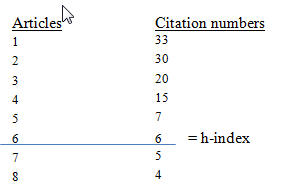What is the h-index
In
2005, physicist Jorge E. Hirsch developed a simple premise to quantify
the scientific output of an individual researcher. ?I propose the index
h, defined as the number of papers with citation number ? h, as a useful
index to calculate the scientific output of a researcher? (Hirsch,
2005).
Reference: Hirsch, J. E. (2005). An index to quantify an individual's scientific research output. Proceedings of the National Academy of Sciences of the United States of America, 102(46), 16569-16572. doi:10.1073/pnas.0507655102
2005, physicist Jorge E. Hirsch developed a simple premise to quantify
the scientific output of an individual researcher. ?I propose the index
h, defined as the number of papers with citation number ? h, as a useful
index to calculate the scientific output of a researcher? (Hirsch,
2005).
Reference: Hirsch, J. E. (2005). An index to quantify an individual's scientific research output. Proceedings of the National Academy of Sciences of the United States of America, 102(46), 16569-16572. doi:10.1073/pnas.0507655102
Limitations to use of h-index
Bletsas, A. & Sahalos, J.N. (2009). Hirsch index rankings require scaling and higher moment. Journal of the American Society for Information Science and Technology, 60(12), 2577-2586.
García-Pérez, M.A. (2011). Strange attractors in the Web of Science database. Journal of Informetrics, 5(1), 214-218.
Jacsó, P. (2008). Testing the calculation of a realistic h-index in
Google Scholar, Scopus, and Web of Science for F.W. Lancaster. Library Trends, 56(4), 784-815.
Jiang, L., Sanderson, M., Willett, P., Norris, M., & Oppenheim,
C. (2010). Ranking of library and information science researchers:
Comparison of data sources for correlating citation data, and expert
judgments. Journal of Informetrics, 4(4), 554-563.
García-Pérez, M.A. (2011). Strange attractors in the Web of Science database. Journal of Informetrics, 5(1), 214-218.
Jacsó, P. (2008). Testing the calculation of a realistic h-index in
Google Scholar, Scopus, and Web of Science for F.W. Lancaster. Library Trends, 56(4), 784-815.
Jiang, L., Sanderson, M., Willett, P., Norris, M., & Oppenheim,
C. (2010). Ranking of library and information science researchers:
Comparison of data sources for correlating citation data, and expert
judgments. Journal of Informetrics, 4(4), 554-563.
How to Determine your h-index
A
researcher's h-index can be calculated manually by locating citation
counts for all published papers and ranking them numercially by the
number of times cited. However, Web of Science, Scopus and Google
Scholar can also be used to calculate an h-index.
researcher's h-index can be calculated manually by locating citation
counts for all published papers and ranking them numercially by the
number of times cited. However, Web of Science, Scopus and Google
Scholar can also be used to calculate an h-index.
Key h-index tools
Scopus and Web
of Science collect and organize citation counts and can calculate an
individual?s h-index. Likewise, Google Scholar collects citations and
calculates and author's via Google Scholar Citation. However, each
source may determine a different value of the h-index for each
individual. Sometimes the variation in the h-index between sources can
be large.
Scopus and Web
of Science collect and organize citation counts and can calculate an
individual?s h-index. Likewise, Google Scholar collects citations and
calculates and author's via Google Scholar Citation. However, each
source may determine a different value of the h-index for each
individual. Sometimes the variation in the h-index between sources can
be large.
- Scopus - multi-disciplinary citation database of peer-reviewed literature with tools to track, analyze and visualize research
- Web of Science
- use the Author Finder option to search this multi-disciplinary
citation database of peer-reviewed literature with tools to track,
analyze and visualize researc - Google Scholar Citations - provides a simple way to check who is citing your publications and graph citations over time
To
determine the h-index of a researcher, organize articles in descending
order, based on the number of times they have been cited. Thus, if an
individual has eight papers that have been cited 33, 30, 20, 15, 7, 6, 5
and 4 times, the individual?s h-index would be 6. The first paper 33,
gives us a 1 ? there is one paper that has been cited at least once, the
second paper gives a 2, there are two papers that have been cited at
least twice, the third paper, 3 and all the way up to 6 with the sixth
highest paper ?the final two papers have no effect in this case as they
have been cited less than six times (Ireland, MacDonald & Stirling,
2013).

Acknowledgments
The material on this page is based on content from the University of Melbourne's Research Impact LibGuide, created by Satu Alakanga and Jennifer Warburton.
